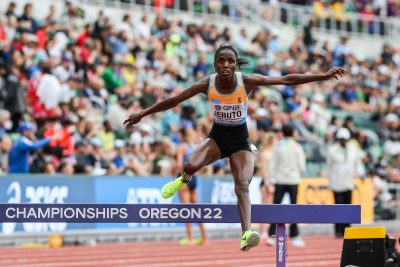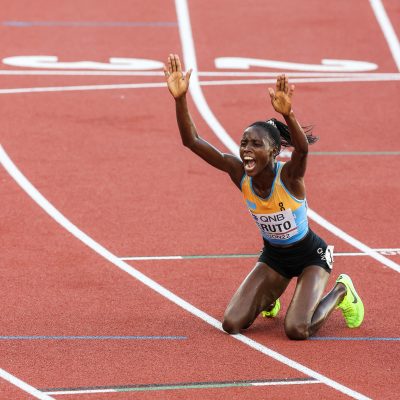Steeplechase World Champ Norah Jeruto’s ABP Drug Suspension Overturned By Tribunal
Jeruto was cleared but panel's decision noted some evidence used to clear her was "confused and difficult to rely on" and "somewhat unsatisfactory"
By Jonathan GaultAfter being provisionally suspended in April and missing the entire 2023 outdoor track season, the Athletics Integrity Unit (AIU) announced today that 2022 world steeplechase champion Norah Jeruto has been reinstated after her suspension was overturned by a World Athletics Disciplinary Tribunal. Jeruto, 28, who was born in Kenya but began representing Kazakhstan in 2022, had been suspended for abnormalities in her Athlete Biological Passport (ABP). The AIU said Jeruto’s ABP profile “constitutes clear evidence that the athlete has commited anti-doping rule violations.” Jeruto, who has never failed a doping test, appealed her case and argued her blood values were the result of illness and ulcer problems.
Jeruto, who likely would also have been the 2021 Olympic champion had she not had to sit out the 2021 Olympics while waiting for her transfer of allegiance to be approved, is immediately eligible to return to competition. The AIU, in a tweet, said it will review the decision before deciding whether to appeal.
On the same day Jeruto was cleared, the AIU announced that another female steepler, Zerfe Wondemagegn, the 21-year-old Ethiopian who finished 4th at this year’s World Championships, has been suspended after testing positive for EPO.
The entire 19-page decision in the Jeruto case can be found here and there are a number of interesting points contained therein. Particularly notable is the timing. The AIU decided to charge Jeruto based on seven samples deemed to have abnormal blood values. Those samples were collected between March 2020 and March 2021. Yet Jeruto was not charged with an anti-doping rule violation until April 2023, more than two years later — during which time she won a gold medal at the World Championships.
Why was Jeruto charged in the first place?
Before charging an athlete with an ABP violation, the AIU consults with a three-person panel of experts, who analyze any abnormal blood values from an athlete’s drug samples. If the panelists all agree there is possible doping, the AIU asks the athlete to provide an explanation for the abnormal values. If, after hearing their explanation, the Expert Panel still unanimously believes that doping is the only possible explanation for the abnormal values, the AIU charges the athlete with an anti-doping rule violation.
For Jeruto, the AIU’s case relied on three separate sets of samples: samples 13-15 (collected between March and May 2020), samples 17-19 (collected between September and October 2020), and sample 25 (collected in March 2021). Samples 13-14 and sample 25 all showed high percentages of immature red blood cells viz. reticulocytes and low levels of hemoglobin, which is indicative of blood loss. The AIU argued that this suggested Jeruto was blood doping: collecting her own blood to be reinjected later as a transfusion. Meanwhile, samples 17-19 displayed high levels of hemoglobin and an increase of red blood cell distribution width, which the AIU argued was indicative of EPO usage.
Jeruto’s explanation
Jeruto hired Paul Greene to represent her in this case — the same lawyer who unsuccessfully represented Shelby Houlihan in her CAS case but who got Jarrion Lawson and Peter Bol cleared in their doping cases. Greene enlisted two expert witnesses — Dr. John Saltzman, a gastroenterolist at Brigham & Women’s Hospital in Boston, and Dr. Stephen Brandt of the Vanderbilt University Medical Center in Nashville, to provide testimony in Jeruto’s defense.
Jeruto explained that the abnormal values in samples 13-15 and 25 were caused by peptic ulcers, which she said are exacerbated by stressful times in her life. That explanation proved largely irrelevant, however as the Disciplinary Tribunal dismissed the AIU’s argument that loss of blood indicates an “Attempted Use” of a prohibited substance or method.
“The withdrawal cannot of itself constitute an attempt to administer blood any more than the purchase of a gun for nefarious purpose can constitute attempted murder,” the Disciplinary Tribunal wrote in its decision.
The discussion surrounding samples 17-19 was far messier. Dr. Giuseppe D’Onofrio argued on behalf of the AIU Expert Panel that Jeruto’s blood values in those samples suggested a “relatively low dose of rEPO.” Jeruto explained that she was sick around the time the samples were collected (a period of 27 days from September 6 – October 2, 2020). Brandt argued her blood values were consistent with a COVID-19 infection, which would stimulate erythropoiesis (red blood cell production). What’s interesting is Jeruto never claimed to have had COVID-19. Jeruto said she went to the hospital during that time and was told she did not have COVID-19, but rather tuberculosis.
The Disciplinary Tribunal had some issues with Jeruto and Brandt’s testimony, noting Jeruto provided no documentary evidence of a hospital visit in September 2020 and describing her evidence as “confused and difficult to rely on.” The Disciplinary Tribunal added that while “the ABP showed abnormal results consistent with a relatively low dose of EPO,” that “there was at least room for the view that Dr. Brandt’s conclusions were somewhat speculative,” and called the factual evidence “somewhat unsatisfactory in relation to this period.”
Yet the Disciplinary Tribunal concluded, “there is sufficient doubt on this part of the case that it would be unfair to convict the Athlete” and dismissed the charges.
Analysis by LetsRun.com
Quick Take: The AIU should never wait two years to charge an athlete
It is important that the AIU be thorough before charging an athlete with an anti-doping rule violation. An athlete’s reputation and career is at stake, and even an overturned charge can have major consequences — Jeruto just lost a year in her prime. But two years — the gap between Jeruto’s final suspicious sample and the date she was charged by the AIU — is simply way too long. Charges must be brought as expeditiously as possible.
If it took them two years to decide whether the case against her was strong enough to pursue, then don’t they already have the answer? (No, it is not).
If the AIU all along believed it had a strong case against Jeruto and simply waited forever to charge her, that might be even worse as the two-year delay is simply unacceptable and unprofessional. It’s not easy for most people to remember what or how they were feeling, etc. two weeks ago. How in the world is an athlete supposed to remember in great detail what happened more than two years ago when they are asked to provide a defense?
In an ABP case with no positive test, if it is not clear and obvious that an athlete is doping, the athlete deserves the benefit of the doubt.
What happened in this case is the worst of both worlds for the AIU — a long delay in bringing the case and an overturned suspension by the Disciplinary Tribunal.
Quick Take: That said, Jeruto’s explanation is hardly convincing
The AIU’s experts had issues with Jeruto’s explanation of GI bleeding as the reason for her blood loss, noting that some of Jeruto’s reported symptoms, including bloody diarrhea, were not consistent with GI bleeding. But the more questionable explanation was that her abnormal blood values in samples 17-19 were caused by a COVID-19 infection. The Disciplinary Tribunal was hardly convinced by Jeruto’s defense and Dr. Brandt’s testimony but had just enough doubt to rule in her favor, but kind of makes sense to us, given how much the scientific consensus on COVID-19 has shifted in recent years.
The Disciplinary Tribunal is a necessary check — athletes need a process by which to appeal a charge from the AIU. And it is to be expected that the Disciplinary Tribunal will overturn a suspension every now and then — if it didn’t, it would not be fulfilling its role. Still, it’s hard to read the full decision and come away completely satisfied, but that’s normally the feeling with most acquittals as there was reason to be suspicious but just not enough to convict.
Some might say it’s not satisfying particularly given how easy Jeruto made everything look in 2022 (she ran 9:01 in her prelim at Worlds). But that type of armchair analysis should have nothing to do with the scientific scrutiny of the samples, which are anonymized before they are analyzed.
It would not be a surprise if the AIU appealed this to the Court of Arbitration for Sport but we kind of hope they don’t as the two-plus year wait to charge was too long to begin with.
Quick Take: For the second time in three months, a 2022 world champion has had their suspension overturned by a Disciplinary Tribunal
Traditionally, it has been difficult for athletes to get their suspensions overturned by a Disciplinary Tribunal. But in August, a Disciplinary Tribunal overturned 2022 world 100m hurdles champion Tobi Amusan‘s provisional suspension for whereabouts failures, and now Jeruto’s suspension has been overturned as well.
The AIU is appealing the Amusan decision to CAS, and Amusan has refused to discuss details of the case, even barring the AIU from releasing the decision of the Disciplinary Tribunal. That case is far from over, and the AIU could yet appeal the Jeruto decision as well. But it’s not a good look for the AIU that two of its highest-profile cases of 2023 have been overturned.
Quick Take: The Jeruto decision could offer hope for Rhonex Kipruto
Back in May, 10k road world record holder Rhonex Kipruto was provisionally suspended by the AIU for an ABP violation. Kipruto proclaimed his innocence, and his coach, the famed Brother Colm O’Connell, who had never had an athlete suspended for doping in four decades of coaching, stood by him. Kipruto’s agency Ikaika Sports also published a lengthy press release defending Kipruto. The fact that Jeruto was cleared shows that it is possible to overturn a suspension for an ABP violation, particularly for one that happened with samples collected during the COVID-19 pandemic.
It’s also notable that Jeruto, as one of the world’s best steeplers, was in position to hire a top American lawyer to defend herself. Many lower-tier athletes who are suspended do not have that luxury.
More: Talk about the case on our world-famous fan forum / messageboard.
AP: World champion runner Norah Jeruto’s doping suspension lifted over claims of ulcers and COVID-19 “It may be that even in such (ABP) cases few are as complex, or involve a dispute as to the scientific evidence between reputable experts in the way this case did,” a tribunal concluded.





